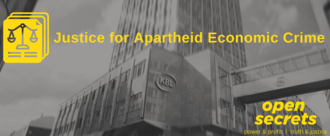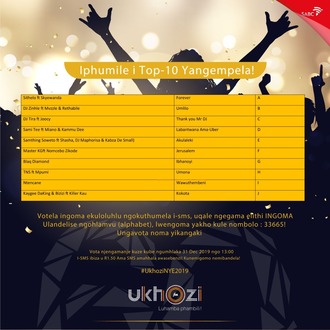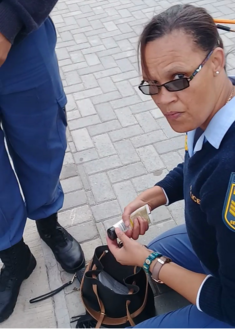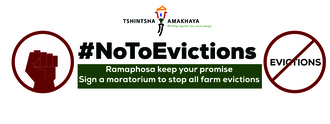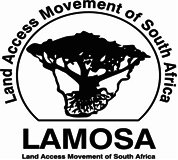- Featured
- Clean air
- Climate justice
- Consumer Rights
- Corporate Accountability
- Data access
- Early Childhood Development
- Economic fairness
- Education
- Electoral fairness
- Environmental justice
- Food justice
- Gender based violence
- Grants/social assistance
- Health
- Housing and infrastructure
- Industry interference
- Land Justice
- LGBTQIA+ rights
- Media/ information access
- Public transport
- Racism
- Reparations
- Safety
- Sanitation
- Service Delivery
- Sexual and Reproductive Rights
- Social justice
- Unemployment
- Womxn's rights/ gender equality
- Workers' rights
- More
-
We demand the government to make the 2nd of January a National Holiday• South Africans celebrate the New Year with great energy, often staying awake through the night of December 31st into January 1st. • Some South Africans cannot even spend New Year's with their families since they are forced to drive back to their respective cities shortly after Christmas so they can report to work on the 2nd. If they spend New Year's, they will have to go back later that evening, and travelling after the 31st festivities is a safety risk due to extreme fatigue. • With South Africa facing high road fatality rates during the festive season, an extra day of rest is a life-saving intervention. • Furthermore, January 2nd holds deep cultural weight as 'Tweede Nuwe Jaar,' historically a day of rest and celebration for the enslaved people of the Cape. It is for these reasons that we demand our government look into making January 2nd a public holiday. Not only does it make it possible for families to celebrate welcoming the New Year together, but it is also a day that will honour our history and heritage. If we all come together and sign this petition, we can pressure the government into ensuring that workers get sufficient family time and rest, as well as honour the history of formerly enslaved people of the Cape.173 of 200 SignaturesCreated by Eugene Maribe
-
Stand with farm women who demand a wealth taxIf there was ever a time in South Africa’s history to impose a wealth tax, it is now. Here’s why: 1. In 2021 the South African Revenue Service appointed the first Director of the High Wealth Individuals Unit, tasked with improving the tax compliance of wealthy individuals and assessing the feasibility of a wealth tax. There is also existing research showing the viability of a wealth tax [1] Argentina successfully implemented a once-off wealth tax generating $2.4 billion in 2021 for COVID-19 relief [2]. 2. Internationally, a group of millionaires and billionaires - Patriotic Millionaires, Millionaires for Humanity and Tax me Now - have called for a permanent wealth tax on the richest citizens in every country (2022) [3]. The world is moving in this direction. Sign the petition to help secure a wealth tax in South Africa NOW! https://youtu.be/9UNUchUQUbo [1] A wealth tax for South Africa, Aroop Chatterjee, Leo Czajka and Amory Gethin for Wits University, January 2021. [2] Critics say a wealth tax wouldn't work. Argentina just brought in $2.4 billion with one, Juliana Kaplan for Business Insider, 4 May 2021 [3] 102 millionaires, including Abigail Disney, have signed another letter asking governments around the world to raise their taxes, Huileng Tan for Business Insider, 19 January 2021.4,489 of 5,000 Signatures
-
Call on the North West Provincial Government to release the Mafereka Commission ReportHelp us strengthen the voices of the Bapo Ba Mogale community in their quest to make the findings of the Mafereka Commission report public. We need your support today! Our demand: We call upon the North West premier to release the Mafereka Commission Report. A report that will assist the Bapo Ba Mogale community in establishing a proper governance structure. The Mafareka Commission is one of many commissions of inquiry established by the North West Province to fact-find the existence of a rightful traditional leadership. Commissions of inquiry should advance values of accountability and participatory democracy. In the absence of transparency, affected communities and interested parties are unable to engage the findings of the commission and the purpose of the commission becomes compromised. [1] https://www.corruptionwatch.org.za/nw-silence-on-mafereka-report-infuriates-mining-communities-2/ [2] https://www.corruptionwatch.org.za/mining-communities-lack-proper-governance-and-support/545 of 600 SignaturesCreated by Corruption Watch
-
#ApartheidBanks: Justice for Apartheid Economic crimeAn important component of accountability is combating impunity and dismantling the networks and institutions responsible for corporate crime, as there is a link between the institutions that perpetrated these crimes in the past and those responsible for state capture today. Holding these instrumental actors to account, including through prosecution, is a critical step to restoring the Rule of Law in our country today. The Commissioners of the Truth and Reconciliation Commission (TRC) have issued a separate letter to Adv. Shamila Batohi calling for the NPA to act on this evidence. We recognise that the TRC, in its final report in 2003, called on the NPA to pursue perpetrators not awarded amnesty through a process of ‘bold prosecutions’ of apartheid crimes. This has not happened, in large part because of political interference in the NPA’s work under previous administrations. It is for this reason that prosecutions against these economic criminals and other apartheid-era human rights violators would send a clear signal that the NPA stands firm against impunity. South Africa faces many pressing problems today, including the profiteers of Covid-19 relief and the legacy of recent state capture networks. The corrupt corporations and politicians who profit from these deals have caused pain and suffering to the South African people. They have made us poorer, more unequal and taken away jobs. The legacy of apartheid-era economic criminals is no less severe and important and we demand that the NPA prosecutes these actors without fear or favour. This is a necessary and urgent step towards social justice. The South African Coalition for Transitional Justice (SACTJ) - endorsed by friends of SACTJ and the following organisations: 1. Centre for Applied Legal Studies (CALS) 2. Centre for the Study of Violence and Reconciliation (CSVR) 3. Foundation for Human Rights (FHR) 4. Human Rights Media Centre (HRMC) 5. Institute for Justice and Reconciliation (IJR) 6. Khulumani Support Group (KSG) 7. (Open Secrets) 8. South African History Archives (SAHA) 9. Violence Prevention Agency (VPA) Additional civil society endorsements: 10. Alternative Information and Development Centre (AIDC) 11. Corruption Watch (CW) 12. International Labour Research and Information Group (ILRIG) 13. Lawyers for Human Rights (LHR) 14. Legal Resources Centre (LRC) 15. My Vote Counts (MVC) 16. Organisation Undoing Tax Abuse (OUTA) 17. Public Affairs Research Institute (PARI) 18. Section27 (S27) 19. Southern African Faith Communities’ Environment Institute (SAFCEI) 20. Southern Africa Litigation Centre (SALC) 21. Shadow World Investigations (SWI) 22. Unpaid Benefits Campaign (UBC) [1] https://www.opensecrets.org.za/site/wp-content/uploads/Apartheid-Banks.-NPA-Docket.-Annexures-1-26.pdf [2] https://www.opensecrets.org.za/apartheidbanksdocket/302 of 400 SignaturesCreated by Open Secrets ZA

-
Demand SABC refunds the top 10 song of the year votersThe SABC started the selection process for "song of the year 2019" and opened voting lines to listeners even though they already knew that they did not have an agreement with the concept owners of "song of the year". The concept owners took the SABC to court to stop this. The Court then instructed the SABC to not air "song of the year 2019", resulting in a loss for all those who had already voted. It is false advertising and unfair to those who voted that the SABC has taken their money but did not deliver a song of the year countdown.34 of 100 SignaturesCreated by Nomvula Maneli
-
Justice for Esethu Mcinjani. We demand police to be held accountableEsethu Mcinjana was arrested on Sunday 19 May 2019,spent the night at Sea Point Police Station.This happened shortly after arriving early for a job interview at a hotel. She arrived early for the interview and went to sit on a bench on the promenade to wait while taking selfies.The two police officers came and searched her going through her handbag. Finally, they decided to arrest her without any valid reason or evidence. This is wrong on many ends and in a democracy of 25 years, it violated so many rights of this Black Womxn. During apartheid in South Africa, the freedom to movement of black citizens to and from urban areas were restricted through pass laws. The right to movement and residence is a key aspect of respecting people's freedom. However, in the case of Esethu it can be concluded that this right was clearly violated because of the color of her skin and the area she was found arrested in. The two police officers failed to uphold the law as they violated Esethu's right to equality. Meaning she was not treated equally and fairly, she was discriminated unfairly on the basis of race, gender, ethnic or social origin. This is evident as she told them and showed them (email/message) why she was in that area, at that point in time. To even question why she is there, is already wrongful in many basis. The arrest could happen to any of us on any given day, especially in a city like Cape Town, were black people's movement is constantly questioned because of racism that continues to thrive even after 25 years of democracy. Surely, this systematic issue needs to be addressed urgently in this country. 1.Ella Ndongeni. A woman was taking selfies on a Sea Point bench. She was arrested and locked in a cell overnight. GroundUp. 23 May 2019 2. Bill of Rights. The Constitution of South Africa.93 of 100 SignaturesCreated by Dineo Mogotsi
-
Rewrite the Victim Empowerment programme booklet to highlight violence against LGBTIQ peopleIt is important that LGBTIQ people feel that the specific ways in which they are victims of violence in SA is named and acknowledged, because it is in framing things right, that we stand a chance at fixing them. Statistics by the Centre for risk analysis at the South African Institute of Race relations in 2017 said that 4 out of 10 LGBTIQ South Africans know someone who has been Murdered for being or suspected of being LGBTIQ. [1] This specific statistic alone, which has grown in 2019, shows that the support needed by LGBTIQ people in South Africa from the justice system is urgent and unique. And as such measures to address their plight as victims of gender based violence need to reflect them uniquely. The booklet rewritten will also educate on LGTBIQ issues, as well as champion the constitution. On this organisations like OUT provide a useful service. One report they produced asks the question: Is being gay unafrican? “Our Constitution says that we are not allowed to discriminate against anyone because of their sexual orientation. However cultural and traditional intolerance and negative attitudes from others still force people to hide their sexuality. As a result, some lesbian or gay people, including those living in African communities, do not disclose or openly show who they really are in public. This does not suggest, however, that homosexuality is un-African. On the contrary, it is clear that homophobia is un- African because it denies people the opportunity to express their full humanity.” [2] South Africa is already doing some of the work, as reflected in this report by the Sonke Gender Justice network... “ The analysis found that South Africa has developed a strong National Strategic Plan for HIV, STIs and TB 2012–2016 in terms of engaging men and boys, a strong 365 Day National Action Plan to End Gender Violence, and is a best practice example in terms of LGBTI policy and law in Africa” (https://genderjustice.org.za/publication/policy-report-south-africa/) We want the booklet to reflect this. [1] https://www.news24.com/Analysis/lgbt-community-still-faces-high-levels-of-violence-report-20171204 [2] https://www.out.org.za/index.php/library/literature?download=3:being-lesbian-or-gay-in-africa51 of 100 SignaturesCreated by Dineo Rabaholo
-
Title deeds for the deserving residents of Pennyville flatsThe majority of people living in Pennyville are currently either unemployed or the families are child run or elderly run with most receiving grants. Most of them cannot afford the rentals and therefore in arrears amounting to thousands of rands. Attempts to address this matter with the relevant authorities have been unsuccessful.59 of 100 SignaturesCreated by Thabiso Seipobi
-
Stop all farm evictions1. Over 20 000 people are threatened by farm evictions in the Western Cape, Tshintsha Amakhaya is calling on president Cyril Ramaphosa to keep his promise following an announcement he made in Paarl in 2014 that there will be a moratorium as an immediate ban on legal and illegal farm evictions. Following the massive farm workers strike in De Doorns, Ramaphosa said, “We are calling on all farmers who have plans for evictions to stop the evictions.” However, the moratorium never came to effect. Instead, instances of farm evictions and human rights violations on farms persist. Today, Drakenstein Municipality has about 1,127 pending eviction matters. 2. The thousands of illegal evictions of farm workers and other farm dwellers continue to be evicted across the country despite the clear protections contained in the Extension of Security of Tenure Act 62 of 1997 (‘ESTA’) that a farm worker and persons living in the same dwelling as the worker may only be evicted: a) in terms of an order of the court b) once the court is satisfied that the eviction would be just and equitable c) and once the Land Claims Court has confirmed the order; 3. The great hardship, conflict and social instability caused by such evictions on a group of people already rendered vulnerable through their insecure tenure. 4. The disproportionate impact of these illegal evictions on women due to the commercial agricultural system that continues to confine women to an auxiliary labour category increasing their vulnerability to labour-related evictions. 5.The total system failure to protect the rights and security of farm workers and dwellers due to poor enforcement and resource endowment of ESTA; 6. The continued failure of municipalities to provide adequate alternative shelter as legislatively prescribed. 7. The Constitutional imperative, in section 25(6), to ensure that person whose tenure of land is legally insecure as a result of past racially discriminatory laws or practices, like farm workers and other farm dwellers, are provided with either legally secure tenure or comparable redress. Both farm workers and dwellers should be prioritised and be at the forefront of cases on which expropriation without compensation will be tested. “We used to work hard on this farm until we were retrenched in 1999. Nothing happened on the farm for 11 years and most of us couldn’t find work again. Now this farmer wants to evict us” This a desperate cry by a mother whose family is facing eviction from the farm she's worked and lived in for years [1]. She, like many others, now face a bleak future of being dumped on the road side with no protection and nowhere to go. President Cyril Ramaphosa made a promise in 2014 to stop farm evictions until people can be given dignified housing [2]. Even more recently, Deputy Minister Mcebisi Sikwatsha has seen with his own eyes the desperate situation farm workers are faced with [3] and also made promises to take it up with his Minister and President. We however cannot leave it to them. Thousands of illegal evictions of farm workers and other farm dwellers continue to be evicted across the country despite the clear protections contained in the Extension of Security of Tenure Act (ESTA). Places like Drakenstein are eviction hotspots with 1,127 pending evictions matters [4]. Evictions bring great hardship, conflict and social instability. The failure to protect the rights and security of farm workers and dwellers due to poor enforcement of ESTA and the failure of municipalities to provide adequate alternative shelter as legislatively prescribed need to be addressed. We need to stand with those being evicted and demand that government responds to the cries of the people. Will you tell President Cyril Ramaphosa and Minister Maite Nkoana-Mashabane to stop all farm evictions and help protect the rights and security of farm workers and dwellers? [1] [3] Western Cape could be testing ground for land expropriation without compensation, says minister, Barbara Maregele for Groundup News. 5 June 2018. [2] Ramaphosa asked to keep his promise to freeze farm evictions, Barbara Maregele for Groundup News. 5 April 2018. [4] Woman faces eviction after 51 years on a farm, Barbara Maregele for Groundup News. 31 May 2018.426 of 500 SignaturesCreated by Tshintsha Amakhaya

-
Scrap the MPRDA Act of 2002 and its amendmentsThe MPRDA of 2002, even though it was later amended, still does not afford any opportunity for consultation with and consent by communities as prescribed in Free Prior and Informed Consent(FPIC). This infringes on the rights of communities to influence decisions about old and new mining in their areas. It contains limited rights on community consultations (It only addressed mitigation of environmental impacts). Communities are still not given space to negotiate the contents of the old and new rights. The MPRDA of 2002 also separates the surface rights from the mineral rights, and converted old order rights of mining companies to mine on communal land to new ones without consulting communities to listen to their views. The Act states that the conversion is automatically granted for as long as the company can show that it has a Black Economic Empowerment (BEE) partner and that the Municipality has agreed to a social labour plan providing for housing and local economic development plans. Once this has been checked, new mining can happen without any consent by the community. All that is required under section 5(a) is a 21 days written notice before mining commences. This cannot be right.1 of 100 SignaturesCreated by Land Access Movement of South Africa
-
Protect Customary Land RightsThe Constitution recognises the informal or customary rights of people living in the former homelands yet the Department of Rural Development and Land Reform has failed to legislate a communal land rights law that will strengthen and protect these rights. As a result; * Big cooperates are grabbing land in the communal land without any compensation for loss citing development. * Nature of individuals and family rights within a broader community are not clarified, and overshadowed by majority in the community. * People are not adequately compensated when land is sold or awarded for big developments * Consultation and Consent of land occupiers is not respected because of the weak nature of the rights provided by current law. In 1996, Parliament passed the Interim Protection of Informal Land Rights Act (IPILRA) to provide protection for all people living on communal land in the former Bantustans, people living on trust land, people who previously had Permissions to Occupy (PTOs) and anyone living on land uninterrupted since 1997 “as if they were the owner”. This was a big milestone in the protection and recognition of customary land rights and the empowerment of families to be part of bargaining and negotiations of any socio-economic development happening in their land. Although people are protected by IPILRA, the fact that it is temporary and can be renewed annually, deprives people of their rights to say NO to development that disadvantages them. This makes it easy for "developers" or Government to easily expropriate the land. It is also worth noting that the law also states that the Minister of Rural Development and Land Reform can make regulations in terms of IPILRA to provide more detailed processes and procedures.83 of 100 SignaturesCreated by Alliance for Rural Democracy
-
Stop the Traditional Leadership and Khoisan Bill as it currently stands.Any law that seeks to facilitate recognition of previously marginalised group or any development of land belonging to the people must ensure that community consultation and consent is at the centre. The TKLB closes down that space and excludes ordinary people from being consulted and give consent on decisions that will affect their lives. There needs to be meaningful public participation. As it stands, the TKLB only highlights consultations with high profile structures such as the House of Traditional Leaders, royal families and traditional councils and there is no mention of rural citizens who are land buyers and customary land rights users. The TKLB supports rural elites' access to wealth and resources. It does not put in place mechanisms that holds leaders accountable to their people. The discovery of mineral wealth in the land that was once considered dry and not productive has brought about disputes where people’s peace is disrupted by big mining companies, and when people react they are suppressed and criminalized.26 of 100 SignaturesCreated by Alliance for Rural Democracy
.png)



